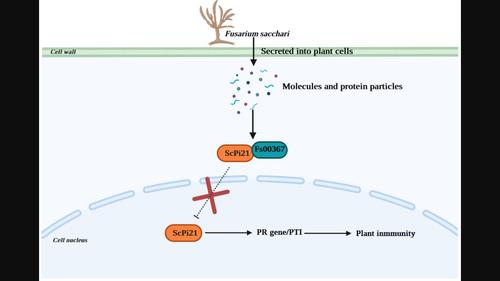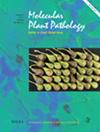Small secreted effector protein from Fusarium sacchari suppresses host immune response by inhibiting ScPi21‐induced cell death
IF 4.8
1区 农林科学
Q1 PLANT SCIENCES
引用次数: 0
Abstract
Abstract Fusarium sacchari is one of the primary pathogens causing pokkah boeng disease, which impairs the yield and quality of sugarcane around the world. Understanding the molecular mechanisms of the F. sacchari effectors that regulate plant immunity is of great importance for the development of novel strategies for the persistent control of pokkah boeng disease. In a previous study, Fs00367 was identified to inhibit BAX‐induced cell death. In this study, Fs00367nsp (without signal peptide) was found to suppress BAX‐induced cell death, reactive oxygen species bursts and callose accumulation. The amino acid region 113–142 of Fs00367nsp is the functional region. Gene mutagenesis indicated that Fs00367 is important for the full virulence of F. sacchari. A yeast two‐hybrid assay revealed an interaction between Fs00367nsp and sugarcane ScPi21 in yeast that was further confirmed using bimolecular fluorescence complementation, pull‐down assay and co‐immunoprecipitation. ScPi21 can induce plant immunity, but this effect could be blunted by Fs00367nsp. These results suggest that Fs00367 is a core pathogenicity factor that suppresses plant immunity through inhibiting ScPi21‐induced cell death. The findings of this study provide new insights into the molecular mechanisms of effectors in regulating plant immunity.

来自囊壳镰刀菌的小分泌效应蛋白通过抑制 ScPi21 诱导的细胞死亡来抑制宿主免疫反应
摘要 Fusarium sacchari 是引起甘蔗褐斑病的主要病原体之一,它损害了世界各地甘蔗的产量和质量。了解调控植物免疫力的囊状镰刀菌效应物的分子机制,对于开发持久控制布病的新策略具有重要意义。在之前的一项研究中,发现 Fs00367 可抑制 BAX 诱导的细胞死亡。本研究发现,Fs00367nsp(不含信号肽)可抑制 BAX 诱导的细胞死亡、活性氧爆发和胼胝质积累。Fs00367nsp 的 113-142 氨基酸区是其功能区。基因诱变表明,Fs00367 对 F. sacchari 的全面毒力非常重要。酵母双杂交试验发现,Fs00367nsp 与甘蔗 ScPi21 在酵母中存在相互作用,并通过双分子荧光互补、牵引试验和共免疫沉淀进一步证实了这一点。这些结果表明,Fs00367 是一种核心致病因子,它通过抑制 ScPi21 诱导的细胞死亡来抑制植物免疫。该研究结果为了解效应因子调控植物免疫的分子机制提供了新的视角。
本文章由计算机程序翻译,如有差异,请以英文原文为准。
求助全文
约1分钟内获得全文
求助全文
来源期刊

Molecular plant pathology
生物-植物科学
CiteScore
9.40
自引率
4.10%
发文量
120
审稿时长
6-12 weeks
期刊介绍:
Molecular Plant Pathology is now an open access journal. Authors pay an article processing charge to publish in the journal and all articles will be freely available to anyone. BSPP members will be granted a 20% discount on article charges. The Editorial focus and policy of the journal has not be changed and the editorial team will continue to apply the same rigorous standards of peer review and acceptance criteria.
文献相关原料
| 公司名称 | 产品信息 | 采购帮参考价格 |
|---|
 求助内容:
求助内容: 应助结果提醒方式:
应助结果提醒方式:


